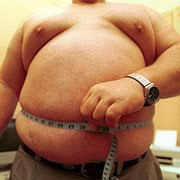Obesity is a term used to describe body weight that is much greater than what is considered healthy. If you are obese, you have a much higher amount of body fat than lean muscle mass.
Adults with a BMI greater than 30 are considered obese.
Anyone more than 100 pounds overweight or with a BMI greater than 40 is considered morbidly obese.
General Information
Nearly two-thirds of the United States population is overweight. There are many ways to determine if a person is overweight, but experts believe that a person's body mass index (BMI) is the most accurate measurement of body fat for children and adults.
- Adults with a BMI between 25 and 29.9 are considered overweight. There are exceptions. For example, an athlete may have a higher BMI but not be overweight.
- Adults with a BMI greater than 30 are considered obese.
- Anyone more than 100 pounds overweight is considered morbidly obese.
Causes
- Alcohol use
- Certain drugs such as corticosteroids, cyproheptadine, lithium, tranquilizers, phenothiazines, some antidepressants, and medicines that increase fluid retention and cause edema
- Cushing syndrome
- Eating too much and exercising too little
- Emotional factors such as guilt, depression, and anxiety
- High-carbohydrate, high-calorie diet
- Hypothyroidism
- Polycystic ovary syndrome
- Slower metabolism, which is normal with aging
- Quitting smoking
Risk factors:

Rates of obesity are climbing. The percentage of children who are overweight has doubled in the last 20 years. The percentage of adolescents who are obese has tripled in the last 20 years.
Consuming more calories than you burn leads to being overweight and, eventually, obesity. The body stores unused calories as fat. Obesity can be the result of:
- Eating more food than the body can use
- Drinking too much alcohol
- Not getting enough exercise
Certain thyroid problems may also lead to signficant weight gain. Genetic factors play some part in the development of obesity -- children of obese parents are 10 times more likely to be obese than children with parents of normal weight.
Obesity is a significant health threat. The extra weight puts unusual stress on all parts of the body. It raises your risk of diabetes, stroke, heart disease, kidney disease, and gallbladder disease. Conditions such as high blood pressure and high cholesterol, which were once thought to mainly affect adults, are often seen in children who are obese. Obesity may also increase the risk for some types of cancer. Persons who are obese are more likely to develop osteoarthritis and sleep apnea.

Signs and tests:
The health care provider will perform a physical exam and ask questions about your medical history, eating habits, and exercise routine.
 Skin fold measurements may be taken to check your body composition.
Skin fold measurements may be taken to check your body composition.
Blood tests may be done to look for thyroid or endocrine problems, which could lead to weight gain.
When to Contact a Medical Professional
Contact your health care provider if the following symptoms occur along with the weight gain:
- Constipation
- Excessive weight gain without a known cause
- Hair loss
- Sensitivity to cold
- Swollen feet and shortness of breath
- Uncontrollable hunger accompanied by palpitations, tremor, and sweating
- Vision changes
A combination of calorie restriction and exercise (when adhered to) appears to be more effective rather than either one alone. Sticking to a weight reduction program is difficult and requires a lot of support from family and friends.
Even modest weight loss can improve your health. It is important to work with your health care provider or dietician to develop a plan that is best for you. For most people, weight can be lost by eating a healthier diet, exercising more, and adopting new behaviors such as keeping a food diary, avoiding food triggers, and thinking positively.
There are many over-the-counter diet products. Most do not work and some can be dangerous. Before using one, talk to your health care provider.
Prescription weight loss drugs are available. Such medicines include subutramine (Meridia) and orlistat (Xenical). Ask your health care provider if these are right for you.
Surgery may be an option for persons who are morbidly obese and who cannot lose weight using other methods. Weight loss surgery, such as placing adjustable bands around the stomach and gastric bypass surgery, can significantly improve weight and health in the right candidate. Talk to your doctor to learn if this is a good option for you.
Complications
Medical problems commonly resulting from untreated obesity and morbid obesity include:
- Diabetes
- Hypertension
- Heart disease
- Stroke
- Certain cancers, including breast and colon
- Depression
- Osteoarthritis
Obesity can lead to a gradual decrease in the level of oxygen in your blood, a condition called hypoxemia. Persons who are obese may temporarily stop breathing while asleep (sleep apnea). Decreased blood oxygen levels and sleep apnea may cause a person to feel sleepy during the day. The conditions may also lead to high blood pressure and pulmonary hypertension. In extreme cases, especially when left untreated, this can lead to right-sided heart failure and ultimately death.
You've tried diets, but you always gain the weight back. What can you do?
Focus on health, not diets. Diets are hard to maintain and usually do not work in the long run. It is very hard to stay with a diet that includes lots of big changes in your eating habits.



Information about "Obesity! path to death?" is really amazing. Also visit my webpage for more relevant information http://indeedrealty.com/author/glynisbarber/
ReplyDelete